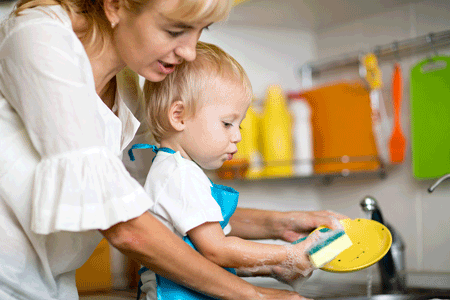How to improve your children’s financial future can be an interesting debate. Parents have lots of different ideas about success for their children (and themselves). But most parents share similar concerns and worries about their children’s long-term financial security and happiness.
Money and happiness are not the same thing, but it appears that certain habits and life skills may improve the chance of achieving both.

At Etax, a lot of our team members are new parents. We often discuss how to set up your children for a successful, happy life and how to influence their future financial stability. We’ve found some interesting research about parenting and ways you can influence your children’s success and happiness.
Below are some ideas we’ve discovered about setting up your children for a great future, touching on how to help build your children’s “money sense” and personal happiness.
1. Get kids busy at home; it could improve your kids’ future success and happiness
Recent research shows that chores at home are a critical part of raising well balanced, happy grown-ups.
Professor Marty Rossmann, a family education research expert, studies young adults and their family lives as they grow up. Taking a group of people who’ve now entered their 20’s, her study examined parenting styles, gender, household responsibilities, time spent on tasks at home, and attitudes.
She also studied those same young people’s stability and ‘success’ based on items like completion of education, starting a career path, IQ, and having positive relationships with family and friends.
What’s the #1 predictor of kids becoming successful, well-adjusted adults?
Professor Rossman’s answer is surprisingly simple: Chores.
Kids who start doing family chores at age 3 to 4 are more likely to be successful AND happy when they reach their 20’s.
Another surprising result of her study: Kids who don’t start doing chores until age 15 or 16 actually do worse later on.1 Starting kids early as helpers at home is more important than some of us imagined.
Of course, keeping kids active with chores, especially throughout their early childhood development, might be easier said than done. Here are a few sites that talk about that particular challenge:
- Kidspot’s 6 ways to get kids to do housework
- Empowering Parents on How to get kids to do chores
- The Centre for Parenting Education on The benefits of kids doing chores
2. Piggy bank basics can teach kids about money
Young people who learn about earning and saving money, early-on, have huge advantages in life. So, teaching some basic money skills and attitudes could improve your children’s financial future. After learning those lessons, young people’s dreams and wants tend to come easier, but are also “well earned”, and sometimes that can make life a bit happier.

One of the best ways to improve your children’s financial future is to “plant the seeds” for simple, positive attitudes and behaviours that will help them later on.
Part of that involves the way we teach kids to think about saving:
Is saving a negative sacrifice, or a positive accomplishment?
Here are some good websites on teaching your kids about money.
- From ASIC – the MoneySmart website
- From the Commonwealth Bank – Teaching your kids about money
- Radio National ‘Life Matters’ radio program (and podcast) about Kids and Cash
3. A bit of smart saving to help improve your children’s financial future
It is amazing how just a little bit of saving, starting when a child is born, can provide an education advantage for your children.
If you can save $100/month, by the time your kids are at university-age, you’ll be able to give them an important boost. If you can save more than that – you might be able to pay for a university degree and save your child from financial pressures while they set up their early career.
For young people, getting started out in their careers, education costs can really slow down their independence and success. And the Government is making education more expensive for young people. What will it cost in another eighteen years?!
Saving for your kids’ education helps ease those worries. When you start saving, there are a lot of options and some possible tax breaks as well.
- Choice.com.au has an interesting guide to saving for your children’s education (an older link but still useful)
- If you look on Google for “education savings plans” you’ll find additional information
Do your homework carefully before you get started – but here’s the most important thing: Just do it! Getting started is the hard part – but once the savings habit is started, most people don’t even notice the difference. However, if you put off education savings for a year, the final savings is much lower.
Even if you can only afford a little bit to start with – get started!
One easy way is to set up an automatic transaction. For example, from the account where you get paid to a “don’t touch” education savings account. Saving money sight-unseen can be easier to live with because you get used to it quickly. But remember – if you start to earn more money and you’re comfortable, then increase the weekly or monthly savings amount.
If you spot any interesting ideas about helping your kids get a good start on life, connect with us by email ([email protected]) or share with us on Facebook. And thanks for any suggested links to good content about helping kids become happy and prosperous!
1 The University of Minnesota has more details about this research. ABC News (US) on Raising Responsible Children.




